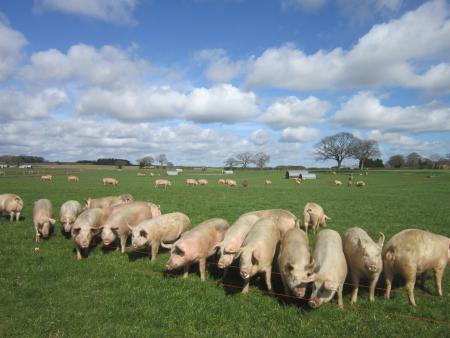NPA responds to new Defra labelling plans
11th Mar 2024 / By Alistair Driver
The NPA has highlighted potential concerns with Defra's plans for changes to food labelling regulations that could have significant implications for the pork supply chain.
 Defra Secretary Steve Barclay has today published a consultation with proposals to deliver more clarity on country of origin labelling, alongside a five-tier method of production labelling system.
Defra Secretary Steve Barclay has today published a consultation with proposals to deliver more clarity on country of origin labelling, alongside a five-tier method of production labelling system.
The consultation also looks at how to improve country of origin labelling for certain goods, including how and where this information is displayed and what products should be included.
Defra said it wants to address a situation where, for example, imported pork is cured into bacon in the UK and features a Union Jack, by exploring ways to make it more obvious to consumers that the pig was reared abroad,
It is seeking views on options for changing origin labelling, including:
- Mandatory origin labelling for minimally processed meat products, such as bacon
- Increased visibility of origin labelling
- Mandatory origin labelling for certain foods in the out of home sector, for example cafes and restaurants
- Greater control of the use of national flags on labels.
The consultation also sets out proposals to require ‘method of production’ labelling on pork, chicken and eggs. These proposals include:
- A mandatory label for both domestic and imported products with five tiers to differente between products that fall below, meet and exceed relevant baseline UK animal welfare regulations. This would underpin standards that are primarily based on method of production.
- The label would cover pork, chicken and eggs. Labelling for dairy, beef and sheep meat will be kept under review, subject to further consultation.
- This would apply to all unprocessed pork, chicken and eggs and certain prepacked and loose minimally processed products with pork, chicken or egg.
The consultation will run for eight weeks, closing on May 7.
Mr Barclay, who announced the consultation at the Oxford Farming Conference in January, said: "British consumers want to buy their produce, but too often products made to lower standards abroad aren’t clearly labelled to tell them apart.
“That is why I want to make labelling showing where and how food is produced fairer and easier to understand – empowering consumers to make informed choices and rewarding our British farmers for producing high-quality, high-welfare food.”
NPA reaction
Defra pulled back from plans to consult on a tiered labelling system linked to method of production last year, in response to concerted opposition from within the supply chain over the cost and complexity of the plans and fears they could mislead consumers over welfare claims.
Commenting before the consultation document had been published, NPA chief executive Lizzie Wilson said: “We will need to see the full details of what is being proposed before giving our verdict on whether they are workable and are likely to achieve their goals.
“The principle of greater transparency and clearer labelling to differentiate high quality British product from inferior imports, of course, has merit. The questions are going to be around how this is delivered in practice, without adding unnecessary costs.”
On the method of production labelling proposals, she added: “Again, we will need to see the full details, but we were part of a widespread coalition of industry bodies that opposed these plans when raised previously by Defra.
“It has to be meaningful for consumers and it could be very difficult to do this reliably for pigs, given that different parts of the carcase can go into many different markets, while there are real concerns over the cost and complexity that the requirement would add into the supply chain.
“We also need to avoid falling into the trap of claiming one system is automatically better than another – method of production is not an indication of good or poor welfare. We would also question how this could be reliably applied to imports.”